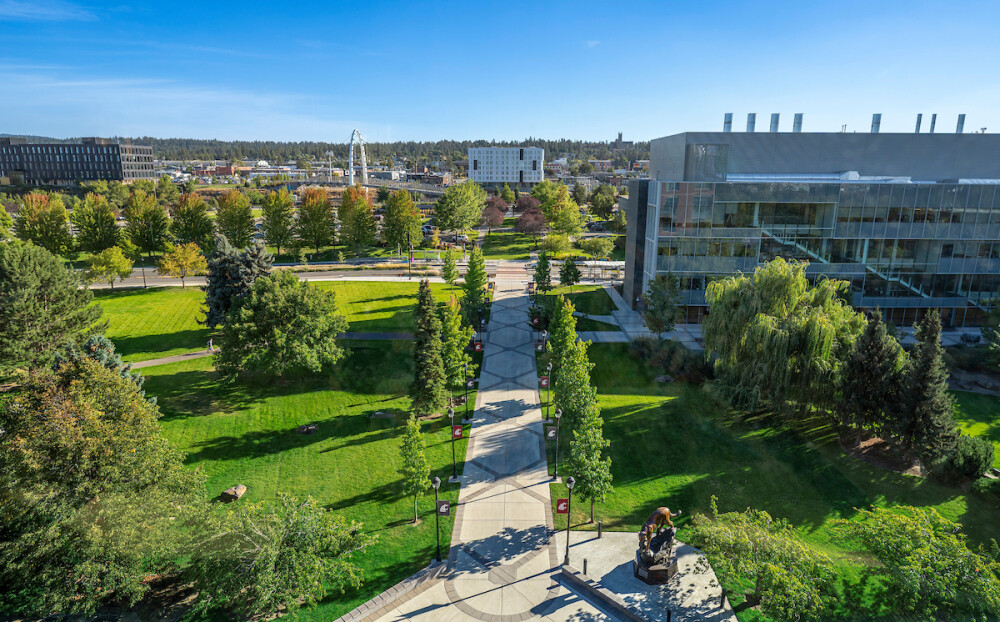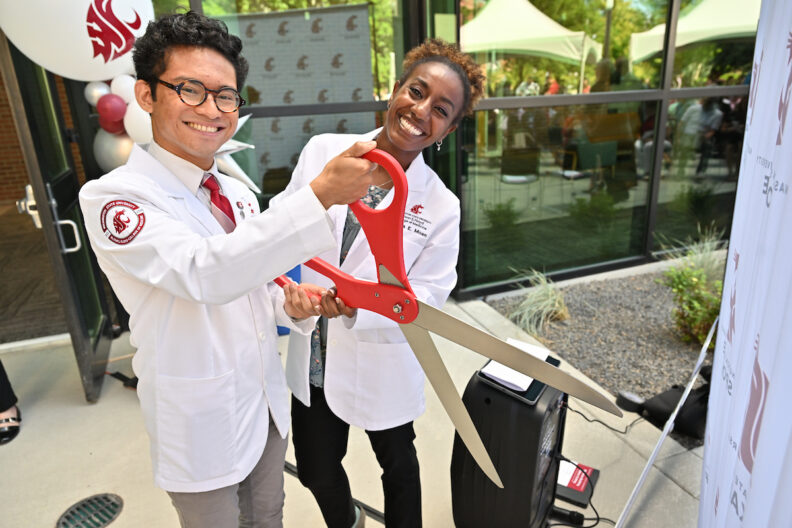WSU Spokane celebrates 15 years as university’s health sciences campus
Friday, September 5, 2025

This September marks the 15th anniversary of the official designation of the Washington State University Spokane campus as the university’s health sciences campus. The designation, which honored the university’s rich history of health education, set the stage for future growth and transformation. Now, a decade and a half later, the campus remains committed to its mission of educating Washington’s future health professionals, serving as the hub for WSU’s health sciences programs offered across the state.
On Sept. 3, 2010, members of the WSU Board of Regents signed a proclamation stating that the campus would focus and commit to grow “graduate and professional education in the biomedical and health sciences, discover new knowledge through fundamental and translational research, and engage with people and communities throughout the region and the state to improve health.”
In an announcement regarding the designation, then Chancellor Brian Pitcher noted that, “Investment in interdisciplinary health science research and education, including medicine, pharmacy, and nursing, will improve health care access, quality of care, and fuel economic growth.”
Building & Expanding
Today, the campus is the primary location for three of WSU’s colleges: the Elson S. Floyd College of Medicine, the College of Nursing, and the College of Pharmacy & Pharmaceutical Sciences. Collectively, these three colleges offer five undergraduate, three professional, and nine graduate degree programs.
In 2010, the campus had not yet finished constructing the Pharmaceutical and Biomedical Sciences building, which would later serve as the permanent home of the College of Pharmacy & Pharmaceutical Sciences. When the facility opened in December 2013, it became the newest building on campus and enabled the college to fully transition from the Pullman campus to Spokane.
WSU Spokane would also work with Providence to construct the Spokane Teaching Health Center (STHC), which opened in 2016. The facility allowed for the expansion of residency slots as well as a collaborative partnership with the Department of Veterans Affairs (VA) and Mann-Grandstaff VA Medical Center.
More recently, the campus completed the renovation of the Phase One Building, renamed the Medicine Building, to be a central hub for the Elson S. Floyd College of Medicine and expand the educational capacity of health sciences programs across the campus.
MD students celebrate the grand opening of the renovated Medicine Building in 2023.
Milestones & Impacts
Along the way, several colleges have also celebrated notable milestones. In 2020, the College of Nursing celebrated 50 years of dedication to nursing education, a legacy that extends all the way back to a shared initiative between area colleges and universities, hospitals, and professional groups in 1967. Today, the College of Nursing offers degree programs not just in Spokane, but in Tri-Cities, Yakima, and Vancouver.
Additionally, the Elson S. Floyd College of Medicine marked its 10th anniversary this spring, honoring WSU leaders and community members who supported the historic launch of the state’s second MD program. The community-based program focuses exclusively on educating students from or with close ties to Washington, as it aims to address physician shortages, particularly in rural and underserved communities.
Improving access to healthcare in rural communities continues to be a focus across the health sciences. In 2023, the College of Pharmacy & Pharmaceutical Sciences launched its Rural Health Initiative, seeking to specifically address rural pharmacy “deserts” caused by workforce gaps. This summer, the College of Nursing launched the Rural Nursing Pathway program to support rural nurses with affordable, flexible education options.
Looking to the Future
Innovative health research and education will remain a key focus for the next decade at WSU Spokane as the campus continues to build on the university’s land-grant tradition and commitment to addressing the state’s pressing healthcare challenges.
Among such efforts is the Team Health Education initiative, which focuses on developing a shared interprofessional simulation space and curriculum to train the next generation. Team Health aims to close the widening gaps in the healthcare workforce, especially by addressing the limited clinical training capacity often found in rural hospitals and clinics. Additionally, programs like the Native American Health Sciences seek to partner with communities across the state to create a strong pipeline of K-12 students eager and prepared to enter the field of healthcare.
To that end, the proclamation reads just as true today as it did 15 years ago:
WHEREAS, by acting boldly now, we will lead the way with new interprofessional approaches that better prepare our graduates, advance evidence-based treatment, improve patient outcomes, and create a measurably healthier Washington.
